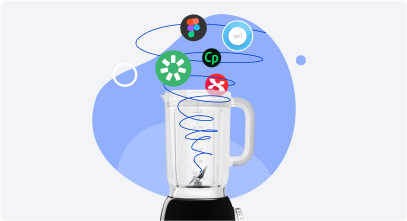The 10 Best eLearning Authoring Tools in 2026

Choosing the right eLearning authoring tool can feel overwhelming. There are dozens of options, each promising great results.

What Are eLearning Authoring Tools?
An eLearning authoring tool is software designed specifically to build structured learning experiences. They are purpose-built around instructional design — so you can add quizzes, assessments, create various scenarios, provide instant feedback, and ensure accessibility and localization. They also support learning standards like SCORM and xAPI, so your content works seamlessly inside an LMS (stands for learning management systems) and functions as true training, not just a presentation.
“Good eLearning isn’t just about putting information on a screen. It’s about creating engaging content, interactive experiences that really help people learn.”
eLearning Authoring Tool Comparison Chart
Here is a quick comparison of all the tools that are mentioned. You can jump straight to the software that looks like the best fit or continue reading the full guide on eLearning authoring tools.
| Software name | Best for | Customization flexibility | Pricing |
|---|---|---|---|
PowerPoint-based course creation enhanced with AI for quick, high-quality results | Medium | $1,290/year. A 14-day free trial is available. | |
Technical and software training with detailed simulations | High | $480/year (individual). A 30-day free trial is available. | |
Collaborative course creation and SME-driven training content | Low to medium | $1,399/year (Pro). Team plans start at $6,995/year. A 14-day free trial is available. | |
Enterprise learning programs and complex engaging courses | High | From $1,199/year. A 30-day free trial is available. | |
Video-based training and screen tutorial creation | Medium | From $31.20/year. A free plan with a watermark is available. | |
Customer training and microlearning for small teams | Low | From $600/year. A free plan is available. | |
Scalable, branded content for enterprise teams | Medium | From $1,650/user/year. Pricing for larger teams upon request. A 14-day free trial is available after the demo. | |
Creating LMS-embedded digital learning content on a budget | Low | Free (open source). Commercial plans from $690/year. | |
| Accessible course design for advanced instructional designers | High | From $1,548/year. A 30-day free trial is available. | |
| Parta | Team-based authoring with a clean, modern interface | Medium | From $600/year. A 30-day free trial is available. |
Types of eLearning Authoring Tools
To help you navigate the list of top tools and find the right fit for your needs, let’s look at the main types of eLearning authoring tools.
- Desktop-based authoring tools. These are programs you install on your computer. They’re packed with features and let you create detailed, multimedia-rich courses. If you want full control to create effective and visually appealing content and aren’t afraid of a bit of a learning curve, this type is a great choice.
- Cloud-based eLearning authoring tools. These run right in your web browser, with no installation required. They’re intuitive, team-friendly, and ideal for collaborative projects, since multiple authors can work on the same course from different locations.
- PowerPoint-based authoring tools. Installed as PowerPoint add-ins, these tools let you create slides and turn existing ones into interactive learning content. You can add quizzes, narration, track learner progress, and then publish your project in LMS-ready formats such as SCORM or xAPI. This option is perfect for teams that already use PowerPoint for training and need to speed up course production without switching to new software.
The Top 10 eLearning Authoring Tools: A Detailed Comparison
Now that we have a basic idea of what we’re going to address with this comparison chart, let’s look at each of the entries in detail.
Best suited for
PowerPoint-based course creation for L&D teams and subject-matter experts who want to build interactive online training fast, without technical overhead.
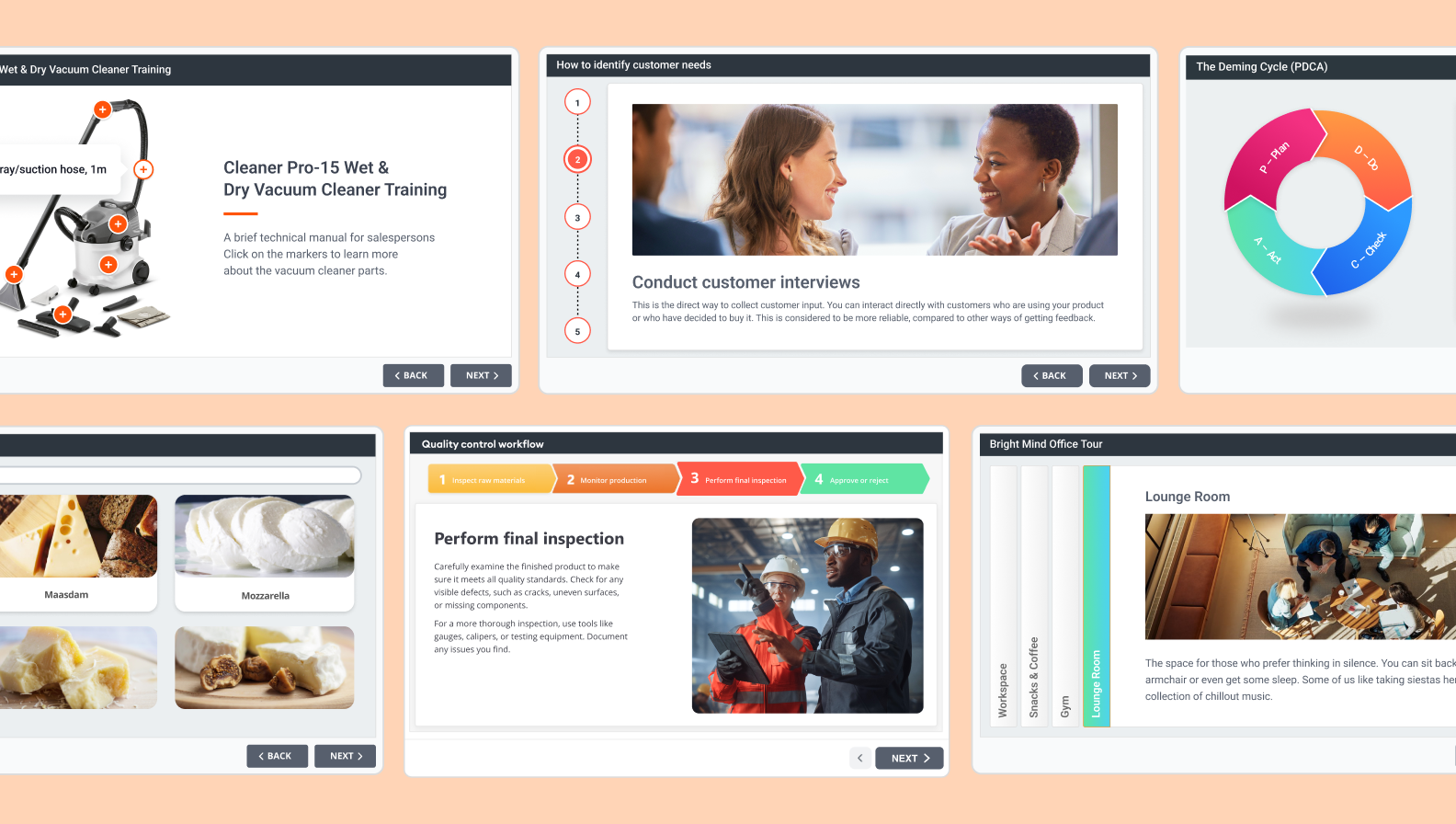
If you’re a Windows user who builds courses in PowerPoint and wants to level up their quality, iSpring Suite AI is a strong fit. It works directly within PowerPoint, allowing you to create elearning content in a familiar, user-friendly interface. You can reuse existing PowerPoint presentations and turn them into complete courses with quizzes, video lectures, screencasts, and branching role-plays.
iSpring Suite AI keeps evolving with new AI-powered features that make training content creation even easier. Users benefit from AI translation to over 70 languages, text-to-speech, built-in AI chat support right in PowerPoint, and cloud-based tools for AI image and text generation.
Quick iSpring Suite AI introduction:
https://www.youtube.com/watch?v=d0eSdZY1zDc
“Integration of PowerPoint with interactive tools in iSpring Suite AI simplifies the authoring process, allowing educators to focus on content quality rather than technical hurdles.”
The iSpring Suite AI package includes Content Library with its high-quality images of characters, controls, icons, and location backgrounds. Customers can also customize character appearance to match their needs and preferences.

Pros
- PowerPoint integration.
- A variety of interactive features: branching scenarios, dialogue simulations, exams, etc.
- Large-scale material generation and deployment capabilities.
- Reliable customer support in the form of tutorials, documentation, and rapid assistance 24/7 via email, chat, and phone.
Cons
- Works only on Windows, and you need to have MS PowerPoint installed.
- Generally compatible with most LMSs (for example, Moodle), but occasional issues may occur with specific platforms or configurations.
Pricing
$1,290 (billed annually). A 14-day free trial is available.
Best suited for
Adobe Captivate is best for teams already working in the Adobe ecosystem and for organizations that need highly customizable, technical training content.
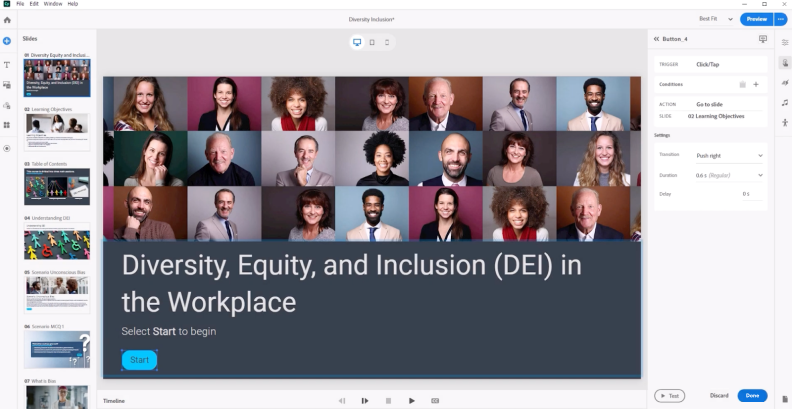
Adobe Captivate interface
Source: Adobe eLearning YouTube channel.
Adobe Captivate is a desktop app that supports deep instructional logic. You can design complex branching paths, trigger actions based on learner behavior, and build multi-layered interactions using variables and advanced settings.
Their screen simulation feature is, I think, what makes them stand out. It allows you to capture each click, keystroke, and input. Trainers can build detailed, step-by-step practice modules where learners demonstrate real system navigation before going live.
Pros
- Very powerful for interactive software simulations with demo, training, and assessment modes from a single recording.
- PowerPoint slides import.
- Built-in AI to generate images, avatars, transcripts, and drafts.
- Deep customization with variables, triggers, and conditions for complex branching and complex interactions.
Cons
- The system uses a lot of memory and processing power.
- Steep learning curve, especially if you haven’t used Adobe tools before.
- Limited, hard‑to‑search content library.
Pricing
$480 per year for the individual plan. Team plan pricing is available upon request. A 30-day free trial is available.
Best suited for
SMEs (subject matter experts), small teams, and organizations that prioritize rapid course creation, collaboration, and employee-generated learning with minimal technical skills.
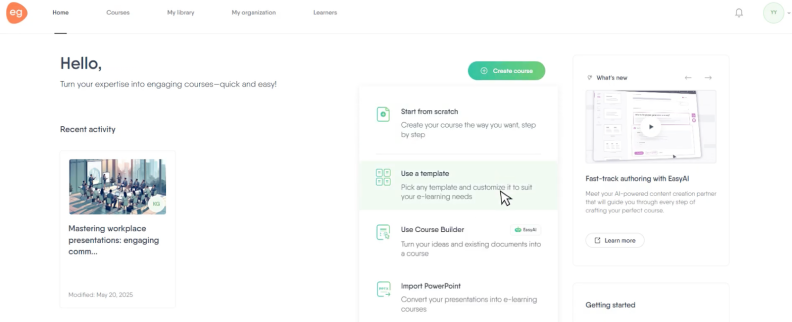
EasyGenerator interface
Source: Easygenerator YouTube channel.
EasyGenerator is a cloud-based eLearning authoring tool designed for speed and simplicity. It offers solid interactivity options, including branching scenarios and walkthroughs that guide learners through real-life tasks.
Pros
- Designed for intensive real-time collaboration thanks to its cloud-based setup.
- Built-in AI to turn docs into a course, brainstorm headlines and structures, generate questions and images. AI translation in 75 languages.
- Reliable 24/5 live chat support in 100 languages.
Cons
- Limited interactivity.
- Content is heavily templated and not fully flexible.
Pricing
Pro plan is $1,399/year for 1 author; Team plan is $6,995/year for 5+ authors. A 14-day free trial is available.
Best suited for
Articulate 360 is best for in‑house L&D teams that need a single, scalable suite for both rapid, mobile‑friendly courses and deeply customized, interaction‑heavy experiences.
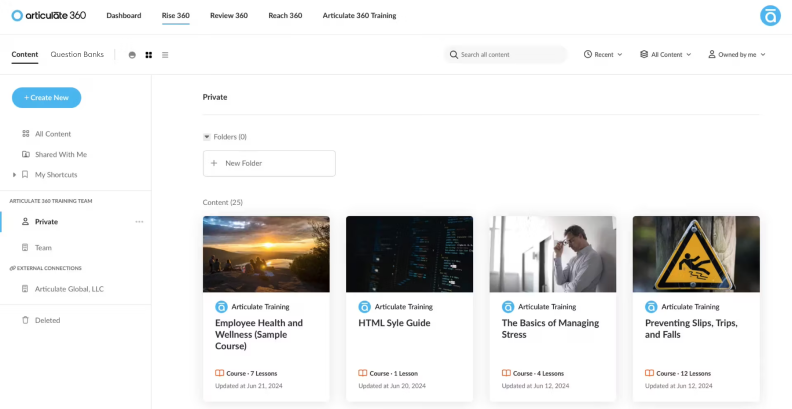
Articulate 360 interface
Source: Articulate 360 YouTube channel.
Articulate 360 is a premium, all‑in‑one desktop-based eLearning suite aimed at corporate trainers and instructional designers who need professional‑grade, interactive courses and collaboration workflows.
The suite includes 2 authoring tools:
Storyline 360 is a desktop app for deeply customizable, slide‑based courses with triggers, variables, and branching.
Rise 360 is a web app for fast, modular, mobile‑friendly content.
Pros
- Highly flexible: Storyline 360 allows “limitless possibilities” through triggers and variables, enabling complex branching scenarios and conditional interactions beyond template‑based tools.
- Support ecosystem: the E‑Learning Heroes community provides abundant examples, troubleshooting, and reusable .story files.
- Strong starting assets: Users can begin from professional templates or imported PowerPoint decks, combining familiarity with more advanced customization.
- AI assistant to turn existing files into courses and generate supporting assets (images, quizzes, etc.)
Cons
- No native Mac version.
- No flexible pricing options. You can only buy the full suite of tools. Which might be an overkill for some teams.
- The ability to use triggers and variables in Storyline opens up creative possibilities, but it also comes with a learning curve.
Pricing
Individual plans start at $1,199/year; Standard Teams at $1,499 per user/year; AI-enhanced plans at $1,449-$1,749 per user/year. A 30-day free trial is available.
Best suited for
Camtasia is ideal for creating professional training videos with ease. No video creation experience required.

Camtasia interface
Camtasia is a flexible desktop-based screen recording and video editing tool. Its user-friendly interface and strong editing features make it easy to record screens, add annotations, apply transitions and effects, and export learning content in multiple video formats.
With advanced features such as audio enhancements, customizable video templates, multi-track timeline editing, and in-video quizzes, Camtasia enables users to create interactive videos with minimal effort.
Pros
- High-quality videos with ease. Up to 4K at 60 frames per second.
- Pre-made animations, such as zooming and panning, to direct your learners’ focus.
- Built-in AI to generate scripts, images, and avatars. AI translation.
Cons
- Camtasia can be slow to load and occasionally glitchy, possibly due to my laptop’s 8 GB of RAM. It’s resource-intensive, especially when handling longer or high-resolution video projects.
- Access to stock assets is limited on the Starter, Essentials, and Create plans, with fewer than 200 audio tracks, videos, and images, compared to 100 M+ assets on the Pro plan.
Pricing
Individual plans start at $31.20/year. Team plans for up to 99 users are $198 per user/year. A free account is available, but your videos will have a Camtasia watermark.
Best suited for
Coassemble works best for easy-to-create customer training and small business employee training. It separates course authoring from LMS delivery, so you can deploy eLearning courses wherever your audience is. It’s good for microlearning.
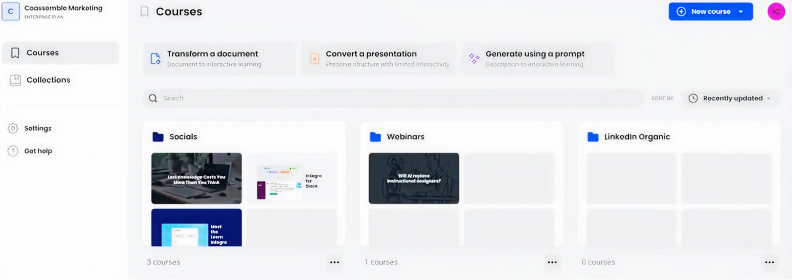
Coassemble interface
Source: Coassemble YouTube channel.
Coassemble is a cloud-based, all-in-one eLearning platform combining both authoring tools and LMS capabilities in a single package. Its standout feature is AI Course Creator, which transforms existing documents (Word, PowerPoint, PDFs) into interactive microlearning courses instantly.
Unlike traditional eLearning authoring tools, Coassemble includes built-in course hosting, learner tracking, and reporting, so you don’t need any separate learning management systems. It also integrates with Slack to deliver training directly in your company or client workspace.
Pros
- Affordability. It offers an industry-leading free plan with unlimited basic eLearning courses, unlimited learners, and full access to AI tools.
- Integrated analytics dashboard.
- Outstanding customer support. It is consistently praised for fast, helpful responses (even on weekends).
Cons
- No hierarchical course structure. You can’t create nested sections, modules, or lessons.
- No flexible navigation paths. Learners have to progress sequentially from the first lesson to the last.
- Limited design and interaction variety with minimal customization.
Pricing
A Team plan with 5 seats starts at $600/year. A free plan is available for 1 creator.
Best suited for
Elucidat is best for enterprise organizations and large L&D teams that need real-time collaboration and high-volume content production with strong branding, analytics, and multi-language support. It’s suitable for SMEs and new content authors.
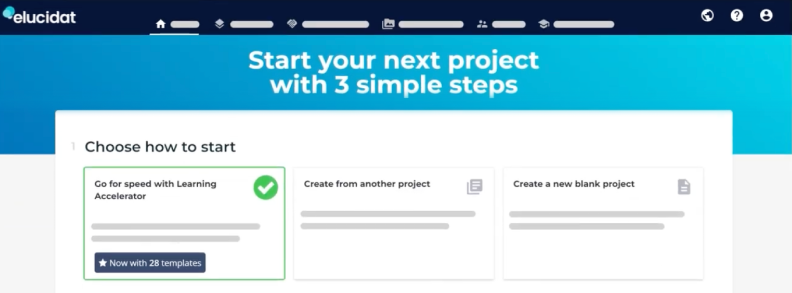
Elucidat interface
Source: Elucidat YouTube channel.
Elucidat is a cloud-based eLearning authoring platform designed for large-scale content production and team collaboration.
Elucidat’s ease of use and in-app guidance make it simple for anyone to create solid eLearning courses with interactive elements. It offers 25+ expert-designed templates that cover a wide range of eLearning formats. If you’re unsure which template to use, the platform provides helpful prompts to guide your selection based on your course goals. Once you’ve chosen a template, the tool also helps you build your course within it, offering step-by-step support throughout the course creation process.
Pros
- Powerful collaboration features. Role-based authoring, built-in commenting, and external reviewer access.
- Template inheritance (parent/child) to ensure brand consistency across thousands of training materials.
- Social polling to get real-time aggregate learner responses during eLearning courses.
- Built-in AI for course generation from PDFs/PPTs, translation, and text-to-speech.
- Instant course updates. Refresh published SCORM/xAPI content without re-uploading files to LMS.
- Outstanding customer support.
Cons
- The customization options may feel limited.
- No flexible pricing options. You have to purchase the full suite of tools, which might be overkill for some teams.
- Built-in characters not available.
Pricing
Growth plan is at $1,650/user/year (for 3-5 users). Pricing for larger plans is available on request. A 14-day free trial after the demo.
Best suited for
For lightweight interactive content inside an LMS or CMS (content management system).

H5P interface
H5P exists in two distinct forms that often confuse users: a completely free open-source framework (h5p.org) and a paid commercial hosted service (h5p.com). The latter differs because it handles hosting, updates, and support and offers a polished authoring experience with team features.
H5P works best for teams that need modular, web-native interactivity embedded into existing platforms rather than complex software simulations or highly customized branching scenarios.
The authoring tool lets trainers quickly create simple games, quizzes, and branching stories.
Pros
- 50+ interactive content types right inside your LMS.
- Embed content anywhere via iframe.
- Active community support (forums, tutorials, documentation).
- Paid version has built-in AI to generate interactive activities from your existing content.
Cons
- LMS dependency.
- No screen recording or video editing tool; relies on external tools for these functions.
- The open-source version requires technical setup and maintenance on your end and doesn’t offer dedicated support (only community-based help).
Pricing
The free open-source version is at H5P.com. The commercial version starts at $690/year for 3 authors. A 14-day free trial is available.
Best suited for
Technical instructional designers who need granular control of interactivities and output.
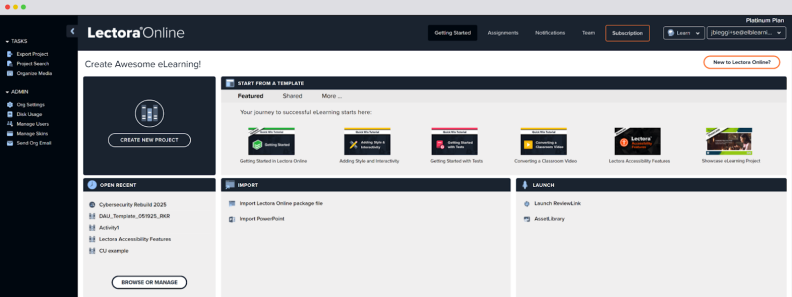
Lectora interface
Lectora (by ELB Learning) is a desktop and cloud-based authoring tool known for its powerful accessibility features, deep customization capabilities, and a variety of interactive elements. It is extremely flexible and customizable with variables, actions, triggers, and JavaScript support.
Pros
- Asset library. Tens of thousands of images, characters, icons, audios, videos, and eLearning and PPT templates.
- VR/AR content is available on higher-tier plans.
- A specialized tool for branching scenarios that supports deeper tracking → more personalized learning paths.
- Strong collaborative features in Lectora Online (multi-author, version control, built-in chat).
Cons
- Desktop UI feels dated and hasn’t been significantly updated in years.
- Customer support can be slow.
- Pricing isn’t flexible. You have to buy the entire toolset, which could be too much for smaller teams.
Pricing
Starts at $1,548/year. A 30-day free trial is available.
Best suited for
It’s ideal for teams that prioritize real-time collaboration, a modern UI/UX, and fast course creation.
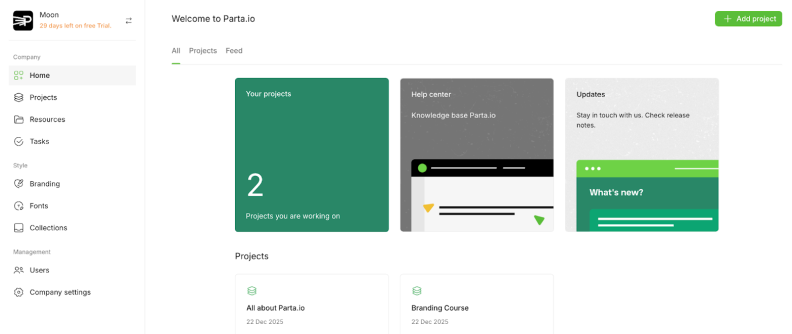
Parta interface
Parta.io is a cloud-based eLearning authoring platform built for collaborative course development. It lets multiple authors work at the same time, similar to Google Docs or Figma. You can also easily share course elements. Responsive design makes it easy to navigate the dashboard.
Parta also stands out with its built-in project management, so you can assign tasks and set deadlines during project planning or editing. Tasks are automatically organized on a Kanban board, enabling you to track progress and seamlessly navigate to specific content blocks.
Pros
- Budget-friendly.
- Custom templates and interactions without coding.
- Branding management. Central “brand packages” with colors, typography, and layout rules that can be applied and swapped across projects with one click.
- Option to integrate any AI provider you already use at no extra cost, switch between providers, and turn AI features on and off.
- Engaged vendor support: Small, responsive team, open to feedback, and willing to dive into your projects.
Cons
- The tool is newly launched, so it has a small user community, and some advanced key features are still in development.
- No branching scenarios builder.
- Not all interactive blocks are fully accessible yet, so strict WCAG/ADA projects may hit limits or require workarounds.
Pricing
The Solo plan is $600/year. The Team plan (under 20 creators) starts at $900/year per user. A 30-day free trial is available.
How to Choose the Right Authoring Tool for Your Needs
In this section, we’ll look at the key factors to test during your free trials of our shortlisted eLearning authoring tools.
- Focus less on flashy capabilities and more on friction — the small moments that slow you down or feel frustrating after the first thirty minutes. Simple tasks like updating text, swapping visuals, or adjusting quizzes will reveal far more about usability than complex features ever will. Tools that seem powerful at first glance can hide extra rework, especially when you need to update content regularly.
- Test how your course behaves inside the LMS rather than taking export compatibility at face value. Tracking, completion data, and interactive quizzes often behave differently across platforms.
- Check customization realistically, too. See how easily you can apply your brand’s look and feel or create slightly non-standard interactions.
- And don’t forget to look beyond the first year of pricing. Pay attention to how costs scale as your team grows, content expands, or advanced features become essential. The best tool should feel dependable and cost-predictable — not just today, but as your training needs mature.

eLearning Software Key Features
Now, let’s take a quick look at the core features most eLearning authoring tools share and why they matter. Understanding these basics will help you compare options more effectively and choose software that fits your needs.
- Drag and drop editor. A visual editor lets you build courses without code. It speeds up production and makes authoring accessible to subject-matter experts, not just instructional designers.
- Built-in interactivity. Features like clickable hotspots, accordions, video pauses with prompts, and matching tasks turn passive content into active learning. These matter when your top-priority task is to enhance learner engagement and retention.
- Flexible assessment options. Multiple-choice, matching, fill-in-the-blank, and open-ended questions let you assess knowledge depth, not just completion.
- Accessibility. eLearning authoring tools help you meet accessibility requirements by supporting keyboard navigation, screen readers, captions, and audio descriptions. This is essential for inclusive training and compliance.
- Responsive design. Your online courses need to work smoothly on desktops, tablets, and mobile devices without manual fixes. This is especially important if learners use different devices or train when on the go.
- Support for eLearning standards. Compatibility with standards such as SCORM or xAPI ensures that your courses work inside LMSs, track the result, and report it correctly.
- Collaboration. Collaboration tools allow multiple authors, reviewers, and stakeholders to work on the same content without version chaos. This becomes increasingly important as teams grow and content volume increases.
A Few Words in Closing
We’ve explored some of the best eLearning authoring tools, how they work, and what makes each one unique. Now it’s your turn to decide which solution fits your goals and workflow best. As you choose, keep in mind what matters most: functionality, price, and how well the eLearning software supports your team’s actual training needs.
FAQ on eLearning Authoring Tools
Here you’ll find the most frequently asked questions about course authoring tools.
What is the most popular authoring tool?
Articulate 360 is the most popular authoring tool among instructional designers. However, it doesn’t fit many course creation use cases because you have to pay for the full suite of tools, even if you don’t need all the functionalities. No other pricing options are available.
Additionally, some experts prefer the familiar, intuitive PowerPoint interface. In this case, iSpring Suite AI is a better option.
Do I need technical skills to use authoring tools?
Generally, no. These tools are designed for users with no coding experience, although some advanced customization might require technical knowledge.
What can my business use authoring tools for?
- Employee onboarding. Create structured onboarding courses that help new hires understand your company, tools, and processes faster, while ensuring a consistent experience across teams and locations.
- Compliance. Deliver engaging and effective mandatory training with assessments and completion tracking to meet legal and regulatory requirements and reduce organizational risk.
- Employee upskilling. Build targeted learning programs that help employees develop skills they want in order to grow, adapt to new tools with confidence, and stay relevant as business needs evolve.
- Customer education. Create courses, product training, tutorials, and onboarding materials that help customers get value faster, reduce support load, and improve adoption and retention.
Can eLearning authoring tools integrate with an LMS?
Yes, most modern eLearning authoring tools are designed to integrate with an LMS seamlessly. This integration is typically achieved through standard eLearning formats such as SCORM (Sharable Content Object Reference Model) or xAPI (Experience API). These standards ensure that the training materials created with eLearning authoring software can be easily uploaded, launched, and tracked within LMS platforms.


